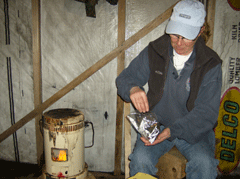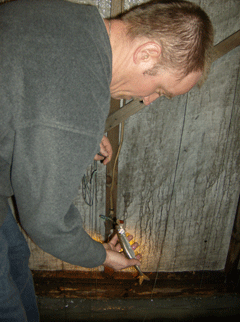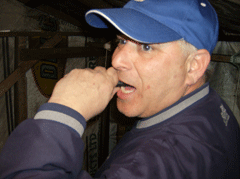Union Conservationists
Air Date: Week of June 1, 2007
.gif)
Bath Iron Works (Photo: Ian Gray)
Environmental protection often comes at the cost of jobs for many working class Americans. But many blue-collar laborers also enjoy spending time outdoors. A number of unions from the AFL-CIO hope to balance these interests by teaming up with a coalition of conservation groups to lobby for the protection of game habitat on public and private lands around the country. Living on Earth’s Ian Gray reports.
Transcript
GELLERMAN: It’s Living on Earth. I’m Bruce Gellerman. There are times when protecting the environment can cost jobs, pitting organized labor groups against conservationists. But on occasion, unions and environmental groups do come together, over shared concerns on issues like international trade or workplace safety. Or as Living on Earth’s Ian Gray has a report on the new Union Sportsmen’s Alliance.
[ICE WALKING SOUNDS]
GRAY: It’s around nine pm on an icy night at Sonny’s Smelt Camp near Dresden, Maine.
MERREL: All right, now we’re ready, we can fish.
GRAY: Sheila Merrel and two of her co-workers, Ronny Wallace and Dan Loudermilk crowd into a small wooden shack over the frozen waters of Merry Meeting Bay.
MERREL: Now, see the bloodworm that’s what we’re fishing with that’s the bait they do bite. Yeah, they’ll bite you. So if you hold em just right they won’t, but when you cut them they will.
GRAY: They’re here to try their luck on the nightly run of smelt, a fish about the size of a mackerel. One by one they set their hooks and drop their lines into the water.

Sheila Merrel grabs a handful of blood worms.(Photo: Ian Gray)
GRAY: Merrel and her friends are avid outdoors people. But that’s not all they have in common. They are also all employed by Bath Iron Works, one of the biggest shipyards in the country. And they’re also members of the International Association of Machinists. As it turns out, many of their fellow union members at the Iron Works also love to hunt and fish.
MERREL: You cannot walk down the production line without seeing pictures of either the fellas or the girls at the yard of what they got this hunting season or last hunting season. Some have a whole wall of all their catches whether it’s fish or deer or bear.
GRAY: But Merrel says that places to hunt and fish in Maine are becoming more and more scarce. A boom in lakefront property is cutting off areas that used to be accessible for fishing. The same is true for hunting lands.
.gif)
Bath Iron Works (Photo: Ian Gray)
GRAY: Plum Creek Timber Company is one of the largest landowners in Maine. The company always made its land available for people to hunt and fish, but as the price of real estate goes up, Plum Creek has sold large tracts of forest to condominium developers. This trend in changing land use isn’t unique to Maine.
MCCARDEN: Our members are definitely finding it harder and harder to find quality areas, whether it’s private or public, to hunt and fish on the weekend when they’re off work.
GRAY: That’s Joe McCarden. He’s a lobbyist for the Plumbers and Pipefitters Union.
McCARDEN: You know a generation or two ago, you could load up your car put some dogs in the back and, you know, a couple buddies could get together and you could ask a farmers permission to go hunting. And that’s becoming a lot more difficult especially as some people are buying these huge estates.
GRAY: For many people, hunting and fishing are not just hobbies, they’re an identity issue, an essential part of life. The desire to defend that way of life is what’s prompted the new Union Sportsman’s Alliance, or USA.
Richard Trumka is Secretary-Treasurer of the AFL-CIO and a fervent fly-fisherman and deer hunter.
TRUMKA: 20 of our unions came together that comprise about 3.2 million of our members, ah, and we said, what do you think about the labor movement getting involved with a conservation group, do you think there’s a need for it? About 70 or 71% of our members said, not only would we like to get involved, but we’d like to join a group that’s sponsored by our union who can help us create habitat for the sports that we like.
GRAY: Then came a happy accident. Fred Myers with the Teddy Roosevelt Conservation Partnership was at a conference of conservation groups in Washington D.C. when he ran into a union leader from the Plumbers and Pipefitters.

Dan Loudermilk with a smelt. (Photo: Ian Gray)
GRAY: Myers decided that since the Teddy Roosevelt Partnership is an umbrella organization for other conservation groups, it was in a good position to help the unions.
MYERS: Their conversations with me were like, what do we tell our guys to do, do we tell them to join the Turkey Federation, join Ducks Unlimited or Pheasants Forever. But most all of them are all what we call species or critter oriented and there really wasn’t one organization out there until the Teddy Roosevelt Conservation Partnership came along that represented the spectrum of all the hunting and fishing groups that are out there.
GRAY: The TRCP operates by building coalitions around individual conservation issues. That appeals to the unions because it allows them to opt in on certain issues and opt out on others that conflict with union interests, such as logging or limits on all-terrain vehicles.
Joe McCarden from the Pipefitters says the collaboration is already starting to influence his union’s legislative agenda. For example, the Pipefitters are supporting a measure in the new Farm Bill that would pay private landowners to keep their property open to the public.
McCARDEN: It works out for everyone involved. The landowner gets some extra money for allowing people to hunt and fish and access is still preserved for working class men and women.
GRAY: Many hunters are also concerned about loss of habitat for game animals. There’s an oil and gas boom going on in the Rockies. Much of the drilling is on public lands where people hunt and fish and energy exploration can often be disruptive for certain species.
McCARDEN: For our members, you know, they’re really at the center of this issue, we get a lot of jobs from natural gas and petroleum exploration but we’re working with the TRCP to really make sure that energy exploration isn’t done in a way that’s going to drive away all the mule deer and the sage grouse in these areas.
GRAY: Sitting elbow-to-elbow with a conservation group at committee hearings on Capitol Hill isn’t exactly a natural environment for a union lobbyist, but McCarden says the Pipefitters’ are adapting
McCARDEN: In the building trades we’ve kind have been labeled as the enemies by the environmentalists, they look at us as the sell-out Democrats who push for energy exploration. And that’s not the TRCP’s position, so there wasn’t that hostility there, but there was a little kind of awkwardness at first.
GRAY: No one knows how many union members will opt to join the USA, but the potential is large. If all the workers of the 20 AFL-CIO unions joined, about 3.2 million people, the USA would rival the National Rifle Association in membership, a fact that’s been noted in NRA literature.
PECK: What’s interesting about this change is that it’s an opportunity to see a new kind of political constituency literally being born.
GRAY: Gunther Peck is a labor and environment historian at Duke University.
PECK: And so I think it would be healthy for the environmental movement to have this new constituency of union conservationists, even if they wrinkle, and they will wrinkle some of the traditional priorities within the mainstream environmental movement.
[SMELT HUT SOUNDS]

Ronny Wallace bites the head off his smelt.
(Photo: Ian Gray)
GRAY: Back in the smelt hut on Merry Meeting Bay, the night grows long and the schools of smelt head out to sea under the last of the spring ice. Sheila Merrel, Ronny Wallace and Dan Loudermilk chase bites of pork rinds with hard lemonade as they swap fish stories.
MERREL and WALLACE: Were you there when I caught that Pike. Oh Christ yes 33 and a half inches she was the only one that caught one what did I say, I told the guys that I had this big old perch, yeah.
GRAY: All of a sudden one of the lines starts to cut against the current.
MULTIPLE VOICES: Get it, where’s Ronald’s bucket, right there three feet that’s the magic number.
GRAY: The first smelt of the night is hauled out of the water, it’s body flaps in the air.
MERREL and WALLCE: You must bite the head I’ll bite it too, Ronny’s got to he caught it wait a minute rules are rules, it doesn’t really taste that bad oh yeah this is serious this is something you guys really do? She does, I’ve never done it give me the goddamn thing good job, son of a bitch.
GRAY: It might not be everyone’s idea of a weekend in the woods but it would be hard to get any closer to nature. For Living on Earth, I’m Ian Gray.
Links
Union Sportsman's Alliance page
Teddy Roosevelt Conservation Partnership
Youtube video of tv show "Escape to the Wild," designed for union sportsmen and women
Living on Earth wants to hear from you!
Living on Earth
62 Calef Highway, Suite 212
Lee, NH 03861
Telephone: 617-287-4121
E-mail: comments@loe.org
Newsletter [Click here]
Donate to Living on Earth!
Living on Earth is an independent media program and relies entirely on contributions from listeners and institutions supporting public service. Please donate now to preserve an independent environmental voice.
NewsletterLiving on Earth offers a weekly delivery of the show's rundown to your mailbox. Sign up for our newsletter today!
 Sailors For The Sea: Be the change you want to sea.
Sailors For The Sea: Be the change you want to sea.
 The Grantham Foundation for the Protection of the Environment: Committed to protecting and improving the health of the global environment.
The Grantham Foundation for the Protection of the Environment: Committed to protecting and improving the health of the global environment.
 Contribute to Living on Earth and receive, as our gift to you, an archival print of one of Mark Seth Lender's extraordinary wildlife photographs. Follow the link to see Mark's current collection of photographs.
Contribute to Living on Earth and receive, as our gift to you, an archival print of one of Mark Seth Lender's extraordinary wildlife photographs. Follow the link to see Mark's current collection of photographs.
 Buy a signed copy of Mark Seth Lender's book Smeagull the Seagull & support Living on Earth
Buy a signed copy of Mark Seth Lender's book Smeagull the Seagull & support Living on Earth

